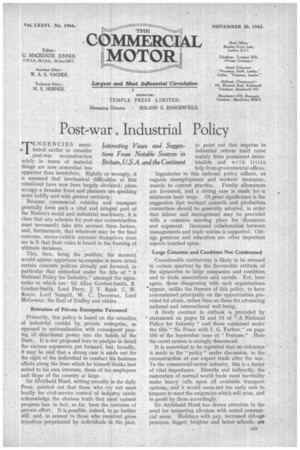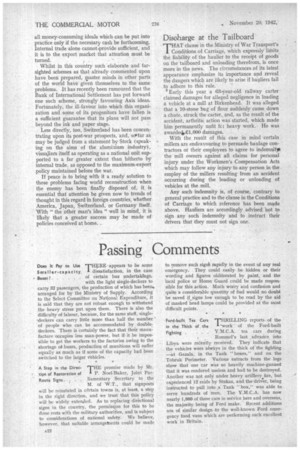Post-war Industrial Policy
Page 23

Page 24

If you've noticed an error in this article please click here to report it so we can fix it.
ENDENCIES mani fested earlier to consider post-war reconstruction solely in terms of material things are now somewhat less apparent than heretofore, Rightly or wrongly, it is assumed that mechanical difficulties at first visualized have now been largely obviated ; plans occupy a broader front and planners are speaking more boldly and with greater certainty. Because commercial vehicles and transport generally form such a vital and integral part of the Nation's social and industrial machinery, it is clear that any schemes for post-war reconstruction must necessarily take into account these 'factors, and, furthermore, that whatever may be the final outcome, motor-vehicle interests themselves must see to it that their voice is heard in the framing of ultimate decisions. . , This, then, being the position, the moment would appear opportune to.examine in more detail certain concrete policies already put forward, in particular that embodied under the title of " A National Policy for Industry," amongst the signatories to which are : Sir Allan Gordon-Smith, R. Gordon-Smith, Lord Perry, J. V. Rank, C. W. Reeve, Lord Sempill, W. C. Devereux, Lord McGowan, the Earl of Dudley and others.
Retention of Private Enterprise Favoured Primarily, this policy is based on the retention of industrial contiol by,, private enterprise, as opposed to nationalization with consequent passing of directional polka into the hands , of the State. It is not proposed here to analyse in detail the various arguments put forward, but, broadly, it may be said that a strong case is made out for the right of the individual to conduct his business affairs along the lines which he himself thinks best suited to his own interests, those of his employees and those of the country at large. Sir Archibald Hurd, writing recently in the daily Press, pointed out that those who cry out most loudly for civil-service control of industry rarely acknowledge the obvious truth that most current • progress has, in fact, so far, been the outcome of private effort. It is possible, indeed, to go farther still, and, in answer to those who resUrrect gross injustices perpetrated by individuals ih the past, to point out that impetus to industrial reform itself came mainly from prominent industrialists and with little help from governmental offices.
Signatories to this national policy adhere, as regards unemployment and workers' insurance, mainly to current practice. Family allowances are favoured, and a strong case is made for .a minimum basic wage. Of great significance is the suggestion that workers', councils and production committees should be generally adopted, in order that labour and management may be provided with a common meeting place for discussion and argument. Increased collaboration between managements and trade unions is supported. Oldage pensions and education are other important aspects touched upon.
Large Concerns and Combines Not Condemned Considerable controversy is likely to be aroused in certain quartersby the favourable attitude of the signatories to large companies and combines and to trade associations and cartels. Yet, here again, those disagreeing with such organizations • appear, unlike the framers of this policy, to have concentrated principally on the opportunities provided for abuse, rather than on those for advancing national and international well-being.
A lively contrast in outlook is provided by ' statements on pages 12 and 13 of "A National Policy for Industry" and those contained under the title " No Peace with I. G. Farben," on page 105 of the September issue of." Fortune." Here the cartel system is strongly denounced.
It is somewhat to be regretted that. do reference' is made in the " policy " under discussion, to the • , reconstruction of our export trade after the war. To the commercial-motor industry, this is a factor of vital importance. Directly and indirectly, the restoration of normal world trade must inevitably make heavy calls upon all available transport systems, and it would seem. not too early now to 'prepare to meet the exigencies which will arise, and to profit by them accordingly. Sir Archibald Hurd, has drawn attention to the need for tempering altruism with sound commercial sense. Holidays with pay, increased old-age pensions, bigger, brighter and better schools, are all money-consuming ideals which can be put into practice only if the necessary cash be forthcoming. Internal trade alone cannot-provide sufficient, and it is to the export market that attention must be turned.
Whilst in this country such elaborate and farsighted schemes as that already commented upon have been prepared, faster. minds in other parts of the world have given themselves to the same problems. It has recently been rumoured that the Bank of International Settlement has put forward one such scheme, strongly favouring Axis ideas. Fortunately, the ill-favour into which this organization and some of its progenitors have fallen is a sufficient guarantee that its plans will not pass beyond the ink and paper stage. • Less directly, too, Switzerland has been concentrating upon its post-war prospects, and, so. far as may be judged from a statement by Steck (speaking on the aims of the aluminium industry), visuajizes itself as operating as a national unit supported to a far greater extent than hitherto by internal trade, as opposed to the maximum-export policy maintained before the war. If peace is to bring with it a read); solution to those problems facing world reconstruction when the enemy has been finally disposed of, it is essential that attention be given now to trends of thought in this regard in foreign countries, whether America, Japan, Switzerland, or Germany itself. With " the other man's idea " well in mind, it is likely that a greater success may he made of policies conceived at home._
Discharge at the Tailboard
THAT clause in the Ministry of War Transport's 1 Conditions of Carriage, which expressly limits the liability of the haulier to the receipt of goods on the tailboard and unloading therefrom, is once more in the news. The circumstances of its latest appearance emphasize its importance and reveal the dangers which are likely to arise if ha:pliers fail to adhere to this rule.
'Early this year a 03-year-old railway carter claimed damages for alleged negligence in loading a vehicle at a mill at Birkenhead. It was alleged that a 10-stone bag of flour suddenly came down a chute, struck the carter, and, as the result of the accident, arthritic action was started, which made him permanently unfit fci heavy work. He was awardetip£1,000 damages.
With the resnit of this case in mind certain millers are endeavouring to persuade -haulage contractors or their employees to agree to indemnify the mill owners against all claims for personal injury under the Workmen's Compensation Acts which may follow any injury to any person in the employ of the millers resulting from an accident occurring during the loading or unloading of vehicles at the mill.
Any such indemnity is, of course, contrary to general practice and to the clause in the Conditions of Carriage to which reference has been made above. Hauliers are accordingly advised not to sign any such indemnity and to instruct their drivers that they must not sign one.




























































